Ranking Georgia’s political parties by gender balance in the 2024 elections
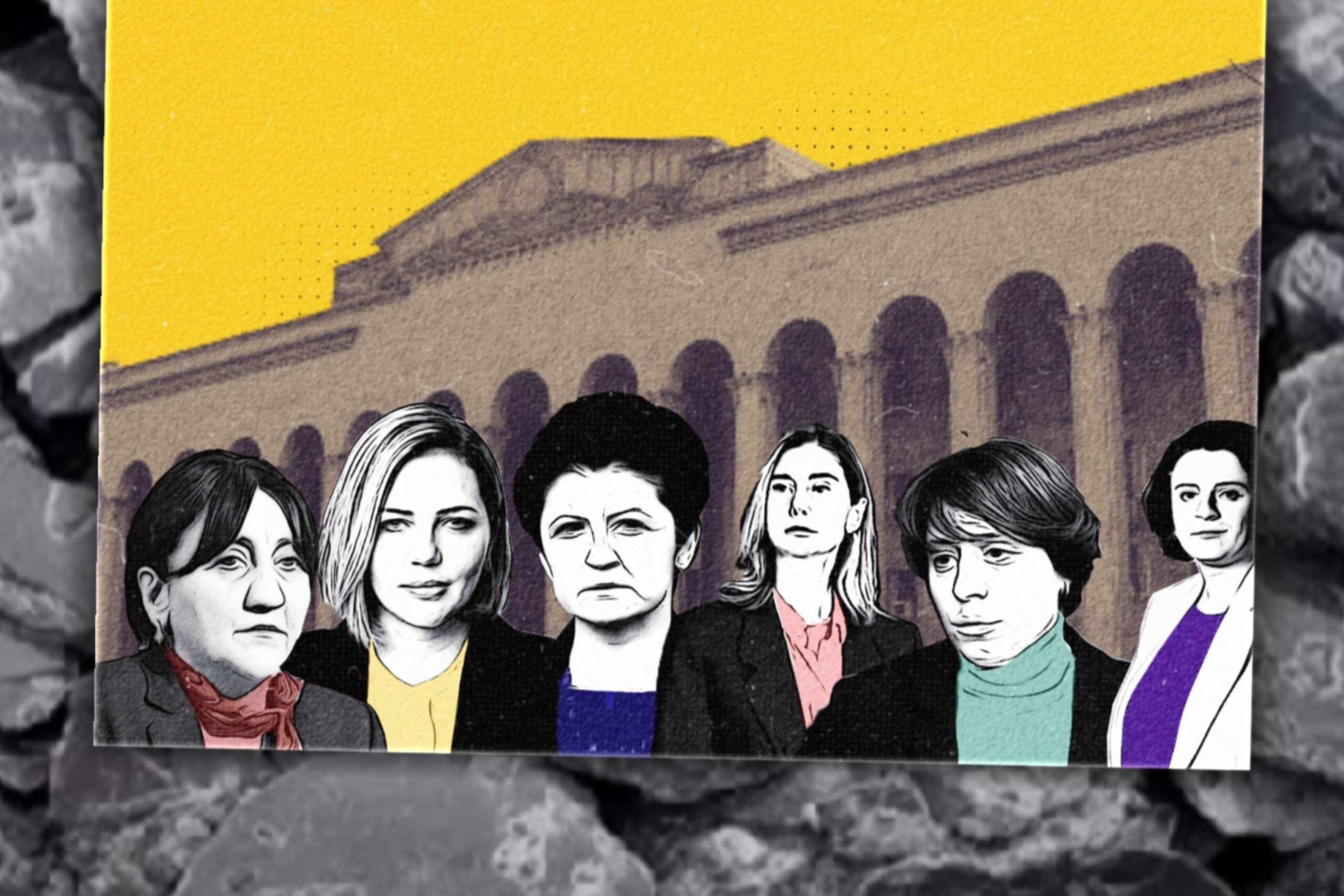
Georgia’s parliamentary elections on 26 October, unlike the previous vote, will be held without any gender quotas. As women’s representation in Georgian politics remains an issue, we have examined the electoral lists of all the major parties and groupings and ranked them based on how many women they included — and how highly they were placed.
The ruling Georgian Dream party pushed through mandatory gender quotas ahead of the 2020 parliamentary and 2021 local elections in an apparent bid to promote gender equality in political representation.
In the parliamentary elections, parties were required to have at least one in every four candidates be of a different gender to the previous three, while for local elections, the quota was one in every three.
However, in April 2023, Georgian Dream scrapped these quotas suddenly and without any dialogue with the relevant stakeholders. The decision was widely criticised as part of Georgian Dream’s turn to the right, and something that directly contradicted the country’s EU membership bid.
Despite most liberal opposition groups formally opposing the scrapping of gender quotas, the lists of none of the groups included in our rankings would have conformed to the quota.
This year’s election will be held under a fully proportional system with a 5% threshold to enter parliament. This means, if a party crosses the threshold, they will receive a set number of seats based on their percentage of the national vote. Individuals will be elected MPs based on their position in their party’s electoral lists, which have been submitted to the Central Election Commission.
For our rankings, we took the top 20 names on the party lists, as many smaller parties and groups are unlikely to win more seats than this. We assigned parties points for each woman based on the position they appear.
To read more about the parties and groups mentioned in this article, check out our explainer on who’s who in Georgia’s parliamentary elections.
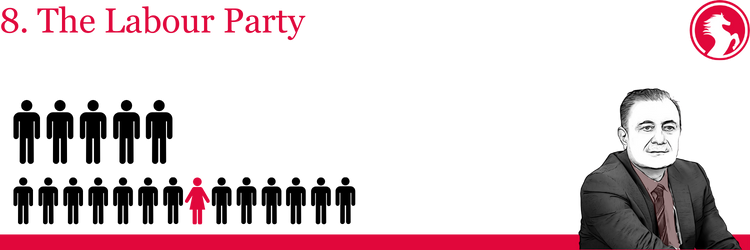
The Labour Party, led by longtime leader Shalva Natelashvili, came last in our ranking. The only woman in the top 20 of their party list, Mariam Gochelashvili, placed 13th, meaning in the unlikely event that Labour crosses the 5% threshold to enter parliament, they would be unlikelier still to have a single woman among their MPs.
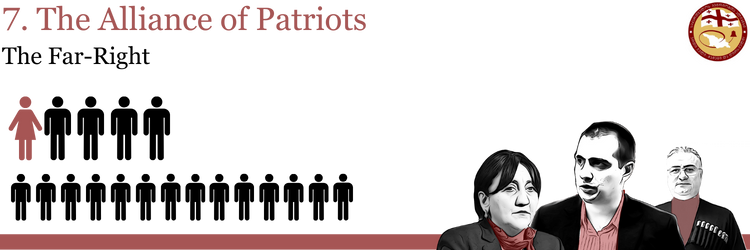
The ultra-conservative Alliance of Patriots, which now also features the far-right Conservative Movement (commonly known as Alt Info), was surprisingly among the groups with the most gender-balanced electoral lists in the 2020 parliamentary elections.
This time, the group has entirely excluded women from their top 20 candidates, except for co-leader Irma Inashvili, who tops the list once again.

The legislative initiative that abolished gender quotas was put forward by Girchi, a libertarian party that has been openly critical of the quota mechanism since its introduction in 2020. It is not hard to see why. Girchi included only two women in the top 20 of their party list, Eka Oniani and Rusudan Abuashvili, who placed 8th and 10th.
As in the case of Labour, if Girchi were to scrape past the 5% threshold, they would likely also be represented only by men.
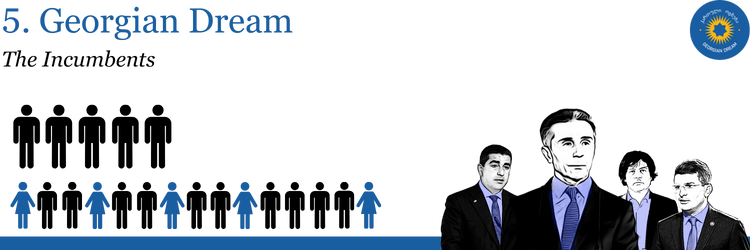
Georgian Dream supported Girchi’s initiative to scrap gender quotas in an apparent deal to secure Girchi’s support for their electoral amendments.
However, Nino Tsilosani, who chairs the party’s women chapter, as well as Parliament’s Gender Equality Council, defended the decision by claiming the quotas had ‘to some extent, already achieved their main task’.
Tsilosani herself appears to have been snubbed in the party’s electoral list, appearing only 61st in the list.
Only five women appear in Georgian Dream’s top 20, with not even party heavyweight Tea Tsulukiani making it into the top five.
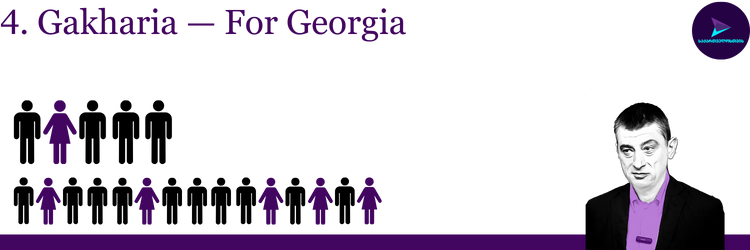
Giorgi Gakharia’s For Georgia party came in fourth with six women in their top 20.
Only one woman appears in the top 5, Gakharia’s longtime second, Natia Mezvrishvili.
Mezvrishvili was Head of the Government Administration of Georgia when Gakharia was Prime Minister, as well as deputy interior minister under him when he was the interior minister.
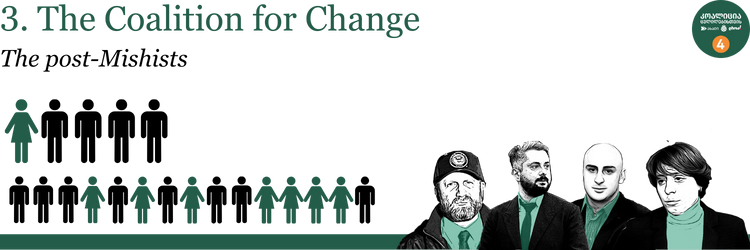
The Coalition for Change came third in our rankings, with eight women in their top 20.
In September, the group announced, to the surprise of many, that their list would be headed by Nana Malashkhia. Malashkhia came to prominence during the protests against the foreign agent law for standing in the path of a water cannon while holding the flag of Europe. She has no prior political experience.
The next woman to appear is Khatuna Samnidze, at the ninth position. Despite being presented as one of four relatively equal leaders, Elene Khoshtaria, who chairs Droa!, placed 16th on the list.
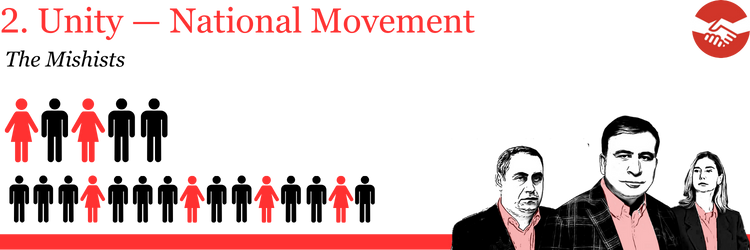
Unity — National Movement came second in our rankings with six women in their top 20. The group edged ahead of the Coalition for Change despite having two fewer women, because of the higher positions these women were given in their list.
While the group remains loyal to imprisoned former president Mikheil Saakashvili, because he has had his citizenship stripped, their list is headed by UNM chair Tina Bokuchava. Sopo Japaridze, another UNM heavyweight, appears third in the list.
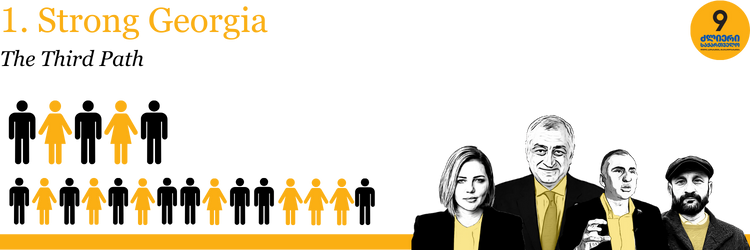
With 45% of their top 20 list being women, Strong Georgia came out firmly in the lead in our rankings. While not led by a woman like Unity or the Coalition for Change, Strong Georgia, stands out with the most gender-balanced list.
Of its top 20 candidates, nine are women, including two in the top five. These include some of Georgia’s most prominent women politicians, such as Anna Dolidze at 2nd on the list, Ana Natsvlishvili at 4th, and longtime MP Salome Samadashvili at 9th.
How our ranking worked
We took the top 20 names on each party list and assigned parties points for each woman they included, based on the position they appear.
For the top spot, we awarded 20 points, for the second spot, 19, and so on, down to one point for the 20th position.
The system means that if a party were to include an equal number of men and women alternating in their lists, they would score 100–110 points, depending if the list were led by a man or woman.
The scores:
- Strong Georgia | 88 points
- Unity — National Movement | 65 points
- Coalition for a Change | 64 points
- Gakharia — For Georgia | 52 points
- Georgian Dream | 43 points
- Girchi | 24 points
- Alliance of Patriots | 20 points
- Labour Party | 8 points










